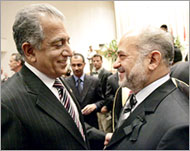Eight killed in US raid near Baghdad
American soldiers in Iraq killed eight suspected anti-US fighters during a raid north of Baghdad on Sunday, the US military said.

Clashes erupted when US soldiers surrounded a suspected safehouse and nearby tent on the northern outskirts of Baghdad.
Five suspected fighters inside the tent were killed. As firing on the soldiers continued, they called for air support, and three assailants were killed in the ensuing air strike, a military statement said.
After the fighting, the US forces discovered bombs and weapons inside the house and detained two suspects. A woman inside the house was wounded when the soldiers entered, but was taken to a hospital and is listed in stable condition, the statement said.
Elsewhere, at least five roadside bombs exploded in Baghdad and south of the capital, killing three people and wounding several others.
A roadside bomb targeting an Iraqi army patrol killed a passer-by in Mahmoudiya, about 30km south of Baghdad, police said.
Fatal weapon
Another civilian was killed and two wounded when a roadside bomb targeting a police patrol exploded at Maysaloun Square in eastern Baghdad.
 |
|
Jaafari (R) has defended his |
Roadside bombings in several Baghdad neighbourhoods killed a police officer and wounded several others, police said.
One of the attacks targeted police near a Sunni mosque in the western neighbourhood of Ghazaliyah, wounding at least three people, police said.
Another targeted a convoy of American military police, but the US military said there were no casualties.
Police discovered a body, shot in the head, in the Dora district of southern Baghdad.
Political deadlock
Politically, top Shia leaders on Sunday were deciding the fate of the prime minister, Ibrahim al-Jaafari.
Leaders of the Shia United Iraqi Alliance (UIA), the largest parliamentary bloc in the country, began a meeting to resolve the political impasse involving Jaafari’s candidacy as the next premier, a source close to the political negotiations said.
He said the meeting was called after Iraq‘s top Shia cleric, Ayatollah Ali al-Sistani, wrote a letter to the alliance asking the leaders to keep the alliance united.
Sistani did not air any opinion on Jaafari in the letter, the source added.
Jaafari has faced pressure from members in the alliance as well as the Kurdish, Sunni and the secular political factions to withdraw his candidacy.
Bloody term
They accuse him of failing to stop the sectarian violelnce that has killed hundreds in recent weeks and thousands throughout his one-year term.
Al-Jaafari has refused to step aside but was ready to decide his candidacy on the floor of the parliament.
“I will stick to the result of the democratic process and reject any bargaining over it,” he told journalists recently, adding that “if the parliament asks me to withdraw, then I will”.
Al-Jaafari’s nomination has been the chief obstacle to efforts to form a unity government nearly four months after controversial elections to choose the first full-term post-Saddam Hussein parliament.
Sunday’s meeting comes after dozens of Shia were killed in a series of bombings this past week.
A suicide car bomber killed six Shia pilgrims on Saturday, a day after three suicide bombers tore through a Shia mosque in Baghdad, killing 79 worshippers after Friday prayers.
Official confessions
Iraq‘s deputy interior minister, Hussein Ali Kamal, on Saturday said that Iraq has been caught in an “undeclared civil war for the past 12 months”.
|
“If the parliament asks me to withdraw, then I will.” |
“On a daily basis Shia, Sunni, Kurds and Christians are being killed, and the only undeclared thing is that a civil war has not been officially announced by the parties involved,” he told BBC’s Arabic service.
His view was supported by Egypt’s president, Hosni Mubarak.
Speaking to Dubai-based Al-Arabiya television, Mubarak said if US-led forces left Iraq “it would be a catastrophe”.
The latest violence also came as the US and Britain pushed Iraq‘s political leaders to form a national unity government as soon as possible.